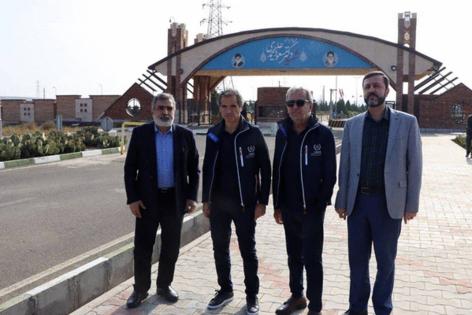US attacked the three main nuclear sites in Iran, Trump says
Published in News & Features
President Donald Trump said American jets struck Iran’s three main nuclear sites, pulling the U.S. directly into the country’s conflict despite his longtime promises to avoid new wars.
Trump said Fordow, Natanz, and Isfahan were struck in the operation, specifically describing a “payload of BOMBS” dropped on Fordow, a key location of uranium enrichment that has raised international concern that Iran was preparing to create a nuclear weapon.
The president called the operation “very successful,” adding that the aircraft involved had exited Iranian air space, and are “safely on their way home.”
“NOW IS THE TIME FOR PEACE!” he wrote on Truth Social.
Trump also said he would address the nation about the military operation at 10 p.m. at the White House.
“Part of the area surrounding the Fordow nuclear site came under aerial attack by enemy forces” early Sunday after air defenses in the city of Qom were activated, Iran’s Tasnim news agency reported, citing a spokesman for the city’s crisis management headquarters. The Fordow nuclear facility sits around 30 kilometers (18 miles) south of Qom, and 100 kilometers (62 miles) south of the capital, Tehran.
Trump’s decision to launch the strikes was a surprise given that he had said late last week he would make a decision within two weeks, suggesting he was willing to give more time for negotiations. On Friday, the foreign ministers of France, Germany and the U.K. had met with Iranian officials in a bid to prevent a U.S. attack.
It could immediately open the U.S. to attack since Iran had warned it would retaliate if Trump ordered strikes. Trump’s combative language in the last couple of days had also triggered new threats from the Iran-backed Houthi rebels in Yemen and led Iranian officials to call the U.S. Israel’s “partner in crime.”
“I hope that the Iranians are measured in their response but there will be a response — this is an act of war by the United States against a foreign country, which has not attacked us lately,” said Barbara Slavin, a distinguished fellow at the Stimson Center. “Americans are at risk all over the Middle East, all over the world.”
Earlier Saturday, the State Department said the U.S. had begun evacuating U.S. citizens from Israel. The agency organized two flights to Athens from Tel Aviv with about 70 U.S. citizens, family member and permanent residents, it said.
The continued fighting has evoked fears of a regional conflict that results in massive civilian casualties, and disrupts the flow of energy and other trade through the region. Around a fifth of the world’s daily oil supply goes through the Strait of Hormuz, which lies between Iran and its gulf Arab neighbors.
For days, Trump had faced conflicting advice from his supporters, after he campaigned for president on promises to keep the U.S. out of foreign wars, pointing to American involvement in Afghanistan and Iraq. MAGA allies including longtime Trump supporter Steve Bannon, have warned against any U.S. intervention, insisting this is Israel’s fight to finish.
Yet other Republicans had been urging Trump to join the fight against Iran, arguing that Tehran was more vulnerable after days of air strikes by Israel, and there was a strong opportunity to deliver on the president’s long insistence the regime cannot be allowed to have a nuclear weapon.
Trump and his advisers had suggested in recent days that any strike would be limited.
“This is not the start of a forever war,” Sen. Jim Risch, the Idaho Republican and chairman of the Senate Foreign Relations Committee, said on X. “There will not be American boots on the ground in Iran. This was a precise, limited strike, which was necessary and by all accounts was very successful.”
Energy experts have raised concerns that crude flows in the region could be imperiled if Iran and its proxies retaliate in response to a U.S. attack. Fears have focused on the Strait of Hormuz, a narrow waterway at the mouth of the Persian Gulf that is a key transit point for 26% of the world’s oil trade. Houthis have previously disrupted Red Sea shipping, with attacks on ships in the Bab el Mandeb strait forcing vessels to reroute around Africa.
A broader attack — including potentially planting naval mines — on the Strait of Hormuz could have even wider consequences, since it’s such a vital artery for the region’s oil and gas output.
U.S. ally Israel had launched a surprise attack on Iran on June 13, saying the imminent threat of the regime in Tehran securing nuclear weapons had to be neutralized. Iran’s military infrastructure was seriously damaged and a number of its top generals and atomic scientists were killed. But Israel lacked the heavy bombs and B-2 stealth jets believed to be required to destroy nuclear sites buried deep underground.
Tehran had responded to Israel’s strikes by firing waves of ballistic missiles and drones, breaching aerial defenses, striking several cities and causing unprecedented damage. But the number of projectiles launched by Iran dropped markedly after the first few days of the conflict, raising questions about the number of missiles left in its arsenal and its ability to launch them.
©2025 Bloomberg L.P. Visit bloomberg.com. Distributed by Tribune Content Agency, LLC.







Comments